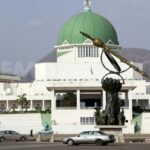The Socio-Economic Rights and Accountability Project has called on President Bola Tinubu to establish a presidential panel of inquiry to investigate the unlawful annulment of the June 12, 1993 elections and identify those responsible for violating Nigerians’ democratic rights.
In a letter dated June 14, 2025, the organization urged the president to direct the Attorney General of the Federation, Lateef Fagbemi, SAN, to prosecute those involved in the annulment, regardless of their political status.
SERAP also demanded that the government amend the Electoral Act 2022 to mandate electronic transmission of election results and grant voters access to election documents.
Additionally, the group called for the discontinuation of all cases against Nigerians arrested for peacefully exercising their rights, including participation in protests.
The letter, signed by SERAP Deputy Director Kolawole Oluwadare, emphasized that President Tinubu’s Democracy Day commitment to “rededicate ourselves to the ideals of June 12; freedom, transparent and accountable government, social justice, active citizen participation, and a just society where no one is oppressed” must be backed by concrete action.
“These expressed commitments won’t be enough unless your government demonstrates the political will to combat impunity for the annulment of the June 12 elections and advance Nigerians’ democratic freedoms,” the letter stated. “No one is above the law, and there is no statute of limitations for violations of democratic freedoms. The ‘ideals of June 12’ cannot be achieved, and real democracy cannot flourish in Nigeria without electoral accountability, democratic and human rights reforms, and strict obedience to the rule of law.”
SERAP argued that amending the Electoral Act to ensure transparency in elections would restore public confidence in the electoral process.
“Impunity for the annulment of the June 12 elections has continued to encourage politicians to undermine the country’s elections and deny Nigerians their right to political participation and other human rights,” the letter read.
The organization also urged the government to repeal repressive laws, including provisions of the Cybercrimes Act and criminal defamation laws, which have been used to target journalists and activists.
“SERAP is concerned that anti-freedom of expression laws continue to be used to intimidate and harass Nigerians peacefully expressing their views,” the letter stated.
SERAP gave the government seven days to act on its demands, warning that failure to comply would result in legal action.
“Our requests are brought in the public interest and in keeping with your expressed commitment to Nigeria’s Democracy Day, the requirements of the Nigerian Constitution 1999 [as amended], and the country’s international human rights obligations,” the letter concluded.







